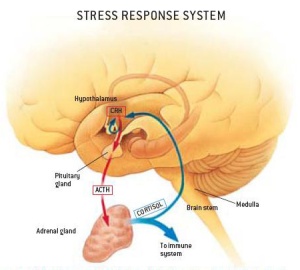 Stress is inevitable in everyday life in society today. It can be caused because of a job, family, finances, emotional or unhealthy relationships. However, when stress is experienced at a higher rate it impacts your immune and digestive systems, so people who suffer from a chronic illness – such as diabetes – it can create even worse problems. Diabetes is one illness which is stressful due to the difficulty of stabilizing blood glucose levels, diet and exercise being a significant part of your daily routine.
Stress is inevitable in everyday life in society today. It can be caused because of a job, family, finances, emotional or unhealthy relationships. However, when stress is experienced at a higher rate it impacts your immune and digestive systems, so people who suffer from a chronic illness – such as diabetes – it can create even worse problems. Diabetes is one illness which is stressful due to the difficulty of stabilizing blood glucose levels, diet and exercise being a significant part of your daily routine.
So what do we know about stress and where it comes from? Stress is more than just an emotion or unpleasant feeling; it is a biological response to a perceived threat or challenge. Stress has been around since the beginning of time when you think about it. The ‘fight or flight’ response that you may feel is because of stress. So animals have this same response – they will either fight or run when threatened; we act in the same way. The nervous system usually balances the body’s responses to daily events in order to maintain proper levels of alertness and relaxation. A little stress can be a good thing because it motivates you to improve performance (team sports or meeting a deadline); it can even enhance our memory ability. When stress becomes chronic and constant then problems will start to arise.
Back in the day of the middle ages society was different and people reacted differently to stress by either being aggressive or by fleeing but today’s society no longer allows that way of life. So not only has our stressors changed, but so has our way of dealing with them. Most people will just allow the stress to build up; this is chronic stress and can cause more negative physical consequences. It reduces ability to fight infections, increases gastrointestinal problems and heightens pain sensitivity. It raises blood pressure and impedes the breakdown of fat in the bloodstream increasing risk of a heart attack and stroke. Chronic stress also affects the brain.
The stress response is actually part of the biological system created in the hypothalamic-pituitary-adrenal glands. Sensory information including stressful things is from the hypothalamus which will emit a hormone called corticotropin releasing hormone, which activates the pituitary gland. The pituitary gland is the master hormonal gland and controls the production of hormones in many different parts of the body. It sends a signal through the blood telling the adrenal glands to produce adrenaline and cotisol. These are the hormones that ready the body for ‘flight or fight’ and will shut down many bodily systems (immune and digestive for instance) so that the body’s energy can be used entirely for the task at hand. This may be great for a short term strategy but in chronic stress will create long term havoc on the body, damaging tissues and increasing incidence of disease and disorders. It will also cause the hippocampus (the area of the brain that shuts down the stress response after it is no longer needed) to become damaged and impair its ability to shut down the stress response.
In the long run chronic stress can start to affect more areas of the brain causing lower ability with mental functions, reasoning, logic, planning, and can breakdown the filters in which certain substances – such as toxins and large molecules – can penetrate the brain. Reducing unnecessary stress will have wide-ranging positive effects, from lowering blood pressure to promoting cardiovascular health. There are many ways to lessen the stress in your life, different things you can do from yoga and exercise to creating a healthier lifestyle.
Want more information in stress reduction visit my website by clicking here. Do you need help with your stress reduction plans? Do you need help with designing a healthy lifestyle? If so contact me today!
Mavis Kelley, CHHC, AADP is a Certified Integrative Health and Wellness Life Coach specializing in nutrition, health, well-being, fitness and lifestyle design. For more information or to schedule a breakthrough session, please contact her at: Mavis@nspirehealthyliving.net or visit her website at: http://NspireHealthyLiving.com.
